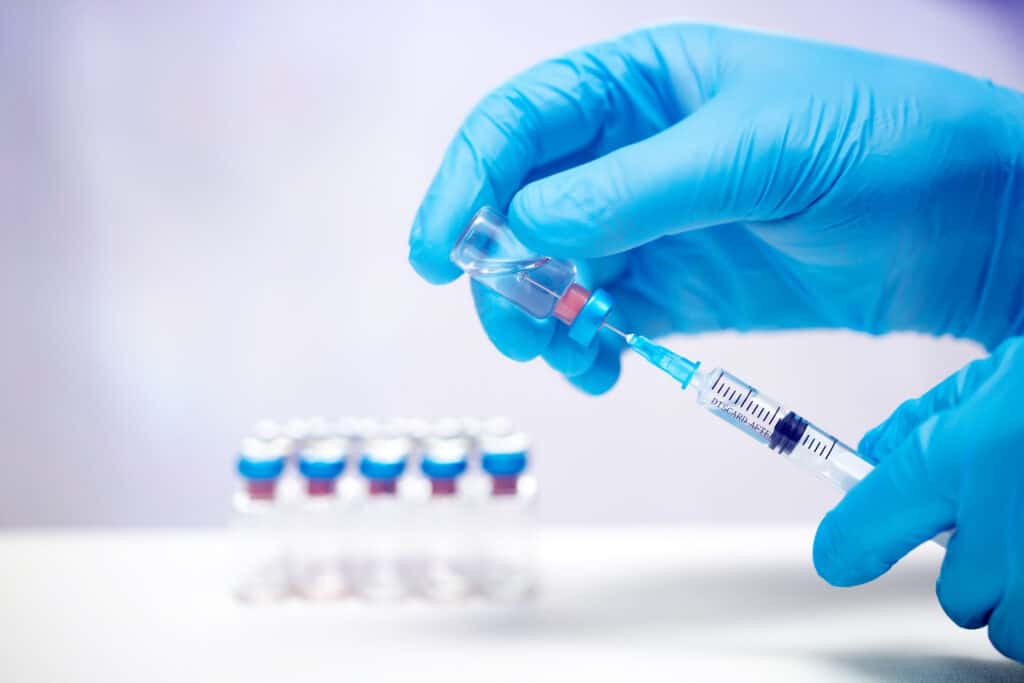
Breast cancer researcher and Komen grantee Dr. Zachary Hartman is pioneering a groundbreaking clinical trial at Duke Cancer Center to test the effectiveness of a vaccine he hopes will improve outcomes for people living with HER2-positive metastatic breast cancer (MBC), including his mother.
People with HER2-positive breast cancer produce extra HER2 protein on cancer cells, which fuels their growth and spread. The vaccine teaches the immune system to fight these HER2 cancer cells.
In laboratory studies, Dr. Hartman found that combining a vaccine to HER2 with another drug significantly boosts the immune response and effectiveness of the vaccine. This FDA-approved drug, known as an immune checkpoint inhibitor, boosts immune responses and is being used in many cancers, including in triple-negative breast cancer.
In the new clinical trial, the vaccine is combined with an immune checkpoint inhibitor to amplify immunity against HER2-positive cancer cells. The vaccine is unique in that it teaches your immune system to target and attack cancerous cells, unlike many traditional cancer drugs that affect cancerous and non-cancerous cells and are only effective while you’re taking those drugs, Dr. Hartman explained.
“There’s a lot of promise and potential in immune-based therapies for metastasis, where you can get a systemic (full body) response and even complete remission or regression.”
“With the inclusion of the immune checkpoint inhibitor, we’re extending the vaccine immune response and preventing the tumor from blocking it,” Dr. Hartman said. “It’s like releasing an important brake for immunity while simultaneously stepping on the gas pedal, so we’re really interested and eager to recruit patients.”
Dr. Hartman has studied immunotherapy for breast cancer for much of his career. Dr. Hartman was finishing his Ph.D. when his father was diagnosed with metastatic prostate cancer, so dedicating his career to cancer research became the clear choice. Since then, he has seen firsthand the need for more effective therapies for people with metastatic cancer.
“This has been a major focus of mine, not only in understanding the progression of metastasis, but also trying to develop immunological-based therapies that would be effective,” Dr. Hartman said. “There’s a lot of promise and potential in immune-based therapies for metastasis, where you can get a systemic (full body) response and even complete remission or regression.”
Dr. Hartman is so confident in the vaccine’s potential to improve patient outcomes that he encouraged his mother to sign up for the clinical trial after she was diagnosed with MBC during the COVID-19 pandemic.
“My mother has already enrolled in the trial and has completed her treatment. My strongest endorsement is I advised my own mother to go on this trial, and she did with positive results,” Dr. Hartman said. “We’ve observed very minimal side effects with the vaccine compared to a lot of other cancer drugs.”
Patients who enroll can also continue taking other therapies during the clinical trial, which Dr. Hartman hopes will encourage more people to participate.
“If you’re on standard-of-care HER2-antibodies therapies (such as trastuzumab), you can continue on that,” he explained. “If you have ER-positive disease, you’re still qualified to be on this trial. If you have a lot of other types of conditions, you’d still probably be qualified for the trial. If you want an anti-cancer vaccine combined with some sort of immunological boost, then I would highly recommend this.”
For those who are interested in learning more about the clinical trial, the study’s homepage contains an extensive list of frequently asked questions.
“I felt less empowered to do anything for my father when he was diagnosed,” Dr. Hartman said. “But this time with my mother, I do feel like, ‘We can do this. I possibly have a solution for this.'”



